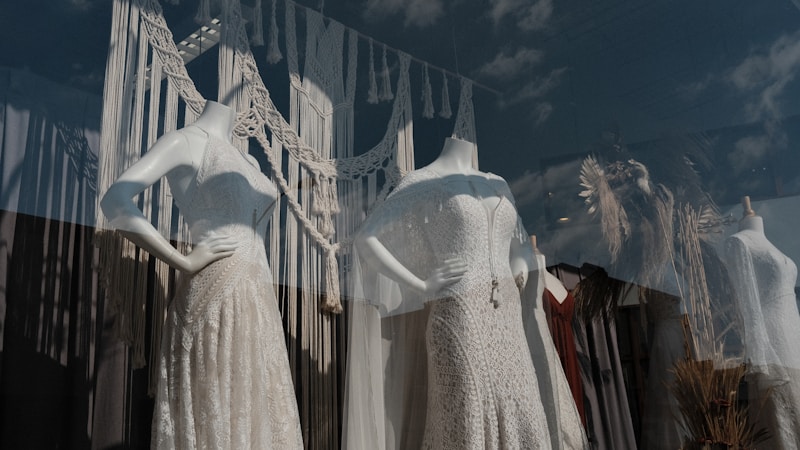Smart Choices for Wedding Dress Purchases: A Comprehensive Guide
Making Smart Choices for Your Wedding Dress Purchases
Purchasing a wedding dress is one of the most significant decisions a bride will make during her wedding planning. With so many styles, designers, and budgets to consider, it can be overwhelming. However, by following some smart choices for wedding dress purchases, you can ensure that you find the perfect gown without unnecessary stress or financial strain.
Understanding Your Budget
When it comes to wedding dress purchases, the first step is to establish a budget. The average cost of a wedding dress in the United States ranges from $1,000 to $2,500. However, knowing how much you're willing to spend helps you narrow down your options and avoid overspending. Consider additional costs such as alterations, accessories, and dry cleaning when establishing your budget.
Setting Your Priorities
Before you begin shopping, identify what’s most important to you. Do you dream of a specific designer or style? Would you prefer a dress that is eco-friendly or locally sourced? By prioritizing your preferences, you will find it easier to make informed choices during your wedding dress purchases.
| Factors to Consider | Details |
| Budget | Average cost of gowns and additional expenses |
| Style | Elegant, boho-chic, vintage, etc. |
| Material | Silk, lace, satin, tulle options |
| Designer | Popular or independent designers |
| Fit and Comfort | Options for alterations and comfort level |
Researching Styles and Trends
Once you have a budget and a sense of your priorities, it’s essential to research the different styles available. Take time to browse through bridal magazines, fashion blogs, and social media platforms like Instagram and Pinterest. You can create a mood board to visualize your favorite designs and trends that resonate with you.
Popular Wedding Dress Styles
Here are some wedding dress styles you might want to consider:
- A-line: Flattering for various body types.
- Ball gown: Ideal for a traditional and elegant look.
- Mermaid: Hugging the body and flaring at the knee.
- Sheath: Sleek and modern, perfect for minimalist brides.
- Empire waist: Great for creating a flattering silhouette, especially for petite brides.
Choosing the Right Fabric
The fabric of your wedding dress plays a crucial role in its overall look and comfort. Here are common fabrics and their characteristics:
- Silk: Luxurious and smooth, suitable for elegant designs.
- Lace: Adds texture and romantic appeal.
- Satin: Glossy and structured, ideal for formal dresses.
- Tulle: Soft and airy, often used for skirts and overlays.
Considering the Season
The season in which you marry impacts your fabric choice and dress style. For a summer wedding, lightweight materials such as chiffon and tulle are ideal. In contrast, heavier fabrics like satin and velvet work well for winter weddings. Planning according to the climate will ensure comfort on your big day.
Where to Shop for Your Wedding Dress
There are multiple options when it comes to shopping for wedding dresses. Here are several popular choices:
- Bridal Boutiques: Offers a curated selection of designer gowns and personalized service.
- Department Stores: Affordable options in various styles, often with in-house alterations.
- Online Retailers: Provides extensive choices and typically lower prices but may lack the personal fitting experience.
- Sample Sales: A great way to score designer dresses at discounted prices.

Scheduling Appointments
When visiting bridal boutiques or salons, schedule appointments to ensure you receive personalized attention. During your fitting, don’t hesitate to ask for the help of your family or friends, as their feedback can be invaluable. Remember to wear comfortable underwear and bring shoes similar to what you plan to wear on your wedding day to get a better idea of the overall look.
Accessorizing Your Wedding Dress
Your wedding dress isn’t complete without the right accessories. Consider the following:
- Veil: Adds elegance and drama to your look.
- Jewelry: Choose pieces that complement your gown, such as classic earrings or a statement necklace.
- Shoes: Keep comfort in mind, especially if you plan to be on your feet all day.
- Belts or Sashes: These can enhance the silhouette of your gown.
Alterations and Fittings
Most wedding dresses will require alterations to achieve the perfect fit. Plan to schedule fittings well in advance of your wedding date, as multiple fittings may be necessary. Find a reputable tailor who specializes in wedding dresses to ensure the best results.
Finalizing Your Purchase
Before making a final decision, consider the following questions:
- Do you feel comfortable and confident in this dress?
- Does it fit your budget?
- Will it allow you to move and dance comfortably?
- Are you able to make necessary alterations and have them fit within your timeline?
Understanding Return and Exchange Policies
Many bridal shops have strict return and exchange policies, so be sure to fully understand these terms before completing your purchase. Ask about the possibility of exchanges in case you have a last-minute change in heart or find a different style that catches your eye.
Conclusion: Smart Choices for Wedding Dress Purchases
Making smart choices for your wedding dress purchases involves careful consideration of various factors including budget, style, fabric, and where to shop. By prioritizing your preferences, setting a realistic budget, and considering seasonality and comfort, you can find a dress that makes you feel beautiful on your special day. Remember, while choosing a wedding dress can be stressful, it is also an exciting part of your wedding journey. Take your time, enjoy the process, and trust your instincts when selecting the perfect wedding gown. Lastly, don’t forget to ensure all aspects of your wardrobe are tailored to fit snugly and enhance your overall look.